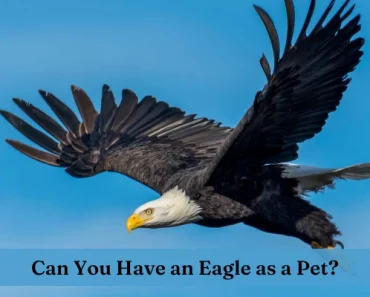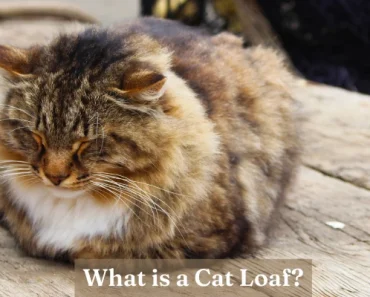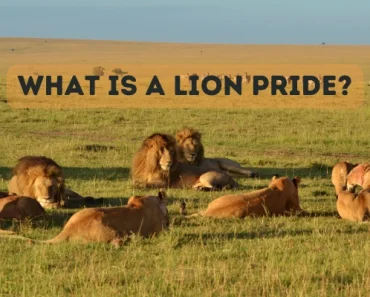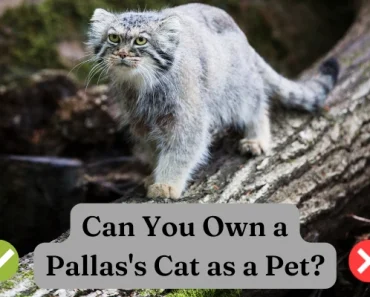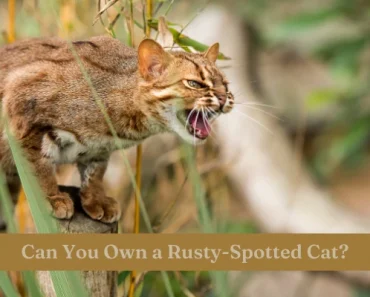Having a pet bobcat is crazy right?!
Well, maybe not so much for some of us.
You may or may not know this, but bobcats are actually found in most of the contiguous United States.
Their environment and habitat can range from the forest and swamplands to a more semidesert, dry area.
While bobcats are not the biggest cat you will find in the wild, they can hold their own, taking down prey much bigger than them.
Bobcats are about 2-3 times the size of your normal house cat but are not as big as the other 3 species in the lynx family, which includes the Canada lynx, Eurasian lynx, and the Iberian lynx.
Since bobcats aren’t that much bigger than domestic house cats, many people wonder if they can have a pet bobcat.
Can You Have a Pet Bobcat?
Yes, you can have a pet bobcat if you are willing to follow the legal process and get a permit or registration through your state, if applicable.
Some states allow a bobcat as a pet without having any permits at all, while other states have banned pet bobcats entirely.
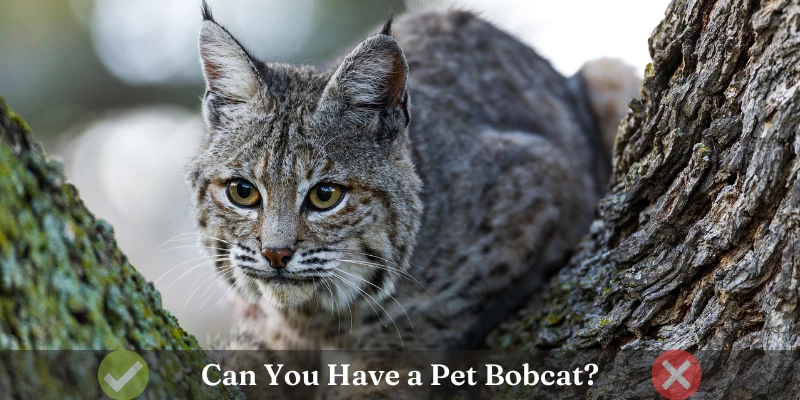
Many states have different laws and regulations about owning a bobcat as a pet, which will be discussed in further detail below.
Can Pet Bobcats Be Domesticated?
Bobcats are not house cats. A pet bobcat will require much more patience and maintenance than your average house cat or other pet.
Handling a bobcat as a pet will take knowledge, experience, and the right caretaker.
There is no guarantee that a bobcat will ever be able to be domesticated, but with the right person who knows what he or she is doing, it is possible to have bobcats as pets.
It requires a great deal of time and effort, and all that effort may be for nothing. I’m not saying all this to deter anyone, just providing the truth about what it will take to handle a bobcat as a pet.
It takes a lot of commitment and understanding as well.
Do You Need a Permit to Have a Pet Bobcat Legally?
Some states require a permit to have a pet bobcat while others have no regulation in place at all. In most states that allow you to have a bobcat as a pet, you will need to obtain a permit and register your pet bobcat to ensure you are following the legal process.
Not all states have this information readily available, so you may have to do a little digging to find out what is permissible in your state.
In Which States Are Pet Bobcats Legal vs Illegal?
Most states have different laws and regulations when it comes to owning pet bobcats.
As stated above, some states allow bobcats as pets while others have no specific law or policy in place.
Some states allow bobcats for the purpose of breeding (furring), but not for the purpose of being a pet.
This can be broken down even further and handled at the city or the county level in your state.
If you are unsure of what is permissible in your state, find the contact information for your state’s wildlife department and get the most up-to-date information from them.
Here is a list of states that allow pet bobcats legally (no permit required):
- Alabama
- Nevada
- North Carolina
- South Carolina
- Wisconsin
Here is a list of states that allow bobcats as pets but you will need a permit and/or registration:
(Some states may only approve permits for wildlife conservations, education, breeding, zoos, etc.)
- Arizona
- Delaware
- Florida
- Indiana
- Maine
- Mississippi
- Missouri
- North Dakota
- Oklahoma
- Pennsylvania
- Rhode Island
- South Dakota
- Texas
- Wisconsin
For all other states, it’s unclear if they have a policy or if they outright ban having a pet bobcat.
However, legislation and policies are always changing, so it’s best to contact your state’s wildlife department to get the most accurate information.
As for other countries, you will have to contact your local government because importing may be an issue even if bobcats were allowed as pets in your country.
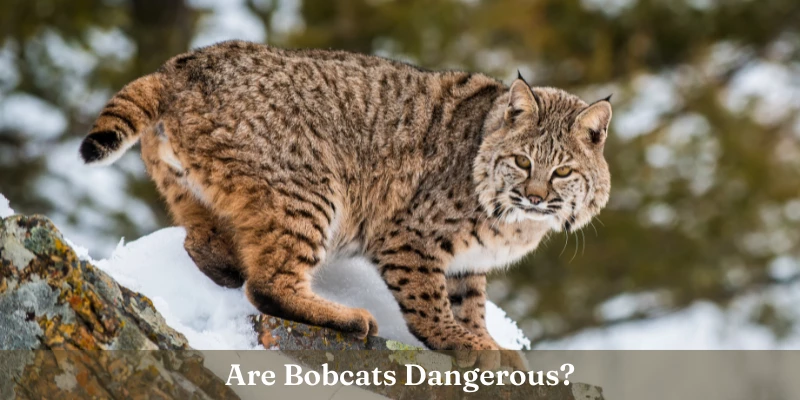
Are Bobcats Dangerous to Humans & Other Pets?
While pet bobcats are smaller in size than most other wild cats, bobcats can still be dangerous to you and your other pets if not domesticated properly.
Wild animals, including bobcats, can be unpredictable even if you raised them from kittens.
The keyword in that sentence is “you”. If you buy a pet bobcat from a breeder or dealer, you can’t be certain of what you are getting.
If the bobcat isn’t a kitten, you are taking a chance because you can never be sure how the cat was domesticated.
Some pet owners have only nice things to say about their pet bobcats and how behaved they can be, so results may vary depending on different circumstances.
You would take less of a chance for issues to arise if your bobcat was raised properly by you as a handler from a kitten to adulthood.
Bobcats are known to prey on smaller animals such as rabbits, squirrels, and feral cats. If you have small pets in the house, instinct can be a hard thing to break.
A bobcat may see these other pets as food, just something to keep in mind.
Attacks by bobcats on humans are rare and there hasn’t been a substantial case reported where a bobcat killed a human, but that doesn’t mean they can’t do damage to you if they tried.
Their fangs and claws are bigger and much more damaging to human flesh than that of a domestic house cat.
Bobcats have been known to attack humans in the past, but not at a high rate. Usually, when this attack occurs, it is because the bobcat is sick or injured.
If scratched or bitten by a bobcat, the potential for catching rabies is a major concern.
However, that’s not to say that a bobcat couldn’t cause damage to a small child or baby and even have the potential to kill them, documented cases or not.
What Do Bobcats Eat in the Wild?
In the wild, bobcats eat a lot of different animals that are typically smaller than them but have also been observed taking down much larger prey by jumping on the prey’s back and biting their neck to bring them down.
Bobcats usually go hunting just before dark.
Here is a list of the common prey for a bobcat in the wild:
- Birds
- Chickens
- Domestic Animals (cats, dogs, goats)
- Fawns (small)
- Feral Cats
- Lizards
- Mice
- Rabbits
- Rats
- Snakes
- Squirrels
What Do Pet Bobcats Eat in Captivity?
If you are thinking about having a pet bobcat, just know what you are getting into. It will not be cheap to feed a bobcat and will require a special diet that could cost you upwards of around $10 per day.
This can consist of special food made for bobcats or several pounds of raw meat, which can range from chicken to rabbit to other meat and organs necessary for a bobcat to get the required nutrients to maintain optimal health.
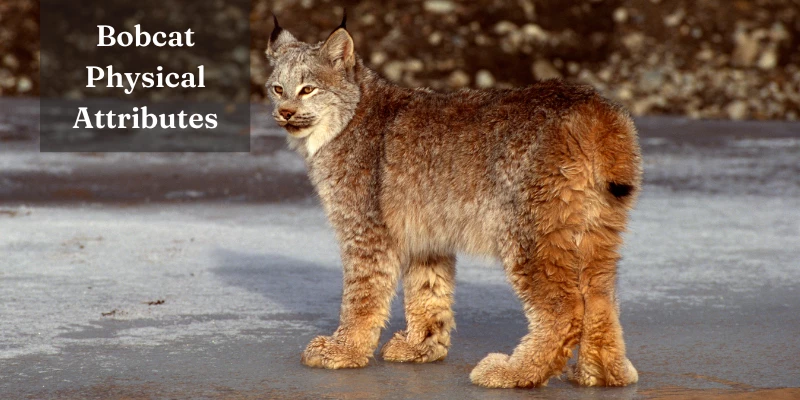
What Are the Physical Attributes of a Bobcat?
Name: Bobcat (Lynx rufus)
Body/Head Length: 25 to 49 inches
Tail Length: 3 to 7 inches
Weight: 12 to 33 pounds
Speed: Up to 30 MPH
Distinctions: The bobcat has black bars on its forelegs and a short, stubby tail with a black tip.
Color: Bobcat fur is brown, can have a reddish tint, and is lighter on their stomach and chest. Some white spots can be found around the tip of their ears and around their tail.
Lifespan in the Wild: 10 to 12 years
Lifespan in Captivity: Up to 30 years
What Is a Bobcat’s Temperament Like?
Bobcats are usually shy and avoid people as much as possible in the wild. Bobcats aren’t thought of as aggressive animals unless you encounter a bobcat with rabies.
Bobcats, like most other animals, can be unpredictable when infected with rabies.
Considerations Before Getting a Pet Bobcat
You will need to have more time and patience with a pet bobcat. Since these animals aren’t bred to be pets like dogs and other animals, their instincts are stronger and the habits can be harder to break.
Some other considerations before getting a pet bobcat are:
- Food budget (raw meat with all the proper nutrients, $10 or more per day)
- Indoor and outdoor housing (bobcats need both)
- Pet insurance (can run up to $1,000 per year)
- Very territorial (bobcats may pee on everything to mark their territory)
Reasons to Not Get a Bobcat as a Pet
I am not trying to deter anyone from getting a bobcat as a pet. I just want you to consider everything.
I’m not against you or anyone having any pet as long as it is within the law, but this is a bigger commitment than your average pet.
I just want you to understand that and to make sure everything has been thought of before going through with such a decision, as you would with any big decision.
That said, here are some reasons you shouldn’t have a pet bobcat:
- Adequate space – You don’t have enough room to have an indoor and outdoor enclosure.
- Baby/Small child – You have small children or a baby in the house.
- Budget – You can’t handle the price tag for care, food, insurance, etc.
- High-maintenance animals – You can’t handle the high maintenance or commitment it takes to care for a bobcat.
- Illegal – Owning a bobcat as a pet in your state is illegal.
- Nice furniture – It may end up being ripped to shreds and/or urinated on.
- Small pets – small pets in the house that may result in issues.
- They look cool – You just want one because they look cool.
- Vet bills – You won’t be able to take your bobcat to just any vet. It will require a specialty veterinarian that specifically deals with bobcats or exotic pets.
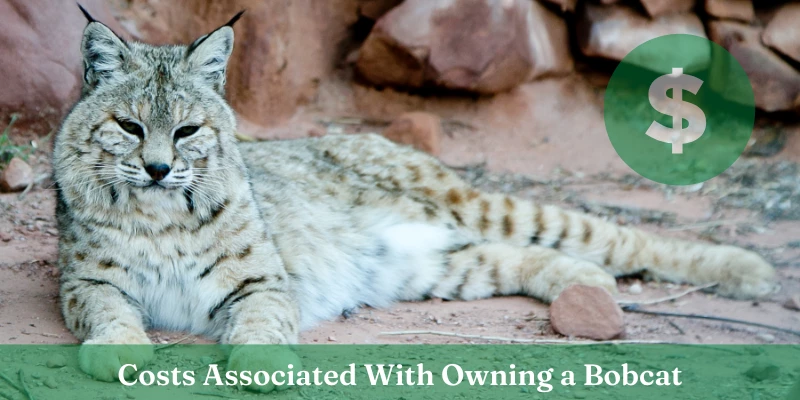
How Much Do Pet Bobcats Cost?
While you must take into consideration how much you are going to spend on having a pet bobcat, you must purchase the animal first.
Since bobcats aren’t your typical pet, most dealers consider them to be “exotic pets” even though you can find them in most areas of the U.S.
Taking that into consideration and the legal fees that you may incur in a state that requires a permit or registration, you are looking at a range from $1,000 to $2,500 in initial costs to purchase your bobcat and get all the legal jargon taken care of.
To find a pet bobcat to purchase, you need to find an exotic animal dealer in your area or close by.
Are Bobcats Endangered?
Bobcats are not on the endangered species list. No one knows for certain, but estimates of how many bobcats are in the wild range from around 700,000 to 1.5 million.
But I doubt any party has counted every single one of them, so who really knows? 🙂
While bobcats aren’t on the endangered species list, some areas and regions may still consider them endangered if the population of bobcats in that area is at a low level.
Recap
Having a pet bobcat just doesn’t seem like a road anyone should go down without doing the proper research and determining if a bobcat is a good fit.
Pet bobcats can get costly, require high maintenance, require adequate space, and may not fit well in certain family environments.
If you were thinking about getting a bobcat as a pet, I hope I was able to inform you well enough to make the right decision for you.
As discussed, having a pet bobcat will not be as easy as handling most other domesticated pets, but some owners seem to believe they are easy to handle and can be great pets with the right handler and environment.
If you decide a bobcat is a right pet for you, make sure it isn’t illegal in your state and never purchase any pet from the black market.
That’s all I have! I hope you enjoyed the read and learned something you didn’t already know about bobcats.
References:
